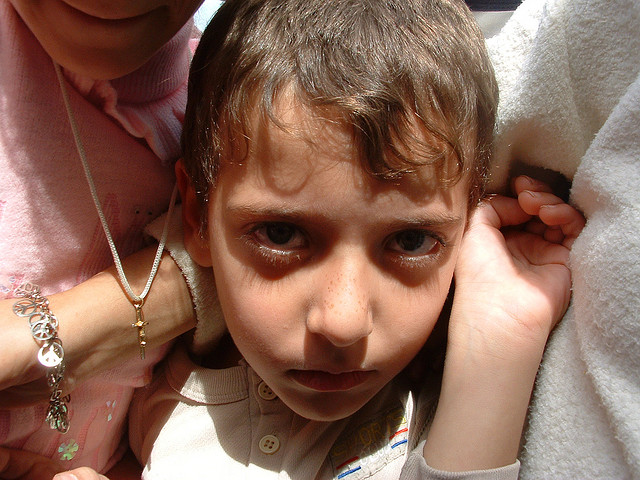
Each year around Christmas, millions of Americans spend time with loved ones.
We cook and drink and laugh and argue and drive to gather in the warm homes of folks that we call “Friends and Family.” Kids play and fight over toys and video-games. Adults cook and drink and argue politics in the kitchen and at the table.
Unequivocally, we touch.
In the winter of 1996, my cousin threw my toy car into the river in front of my grandparent’s house. I was heartbroken, furious. He insisted to the adults later that I wasn’t sharing the aforementioned hot wheels. The “solution” that was insisted by one adult, was that he mutter an apology and we “hug it out.”
But I didn’t want to hug him. He was my age, and posed no threat, but I was upset, furious and confused. Why was my relative telling me I had to wrap my arms around his skinny body, press our chests together and hold this pose? Would that bring my car back?
Our society does not teach children how to voice consent.
Our society does not give our children the tools to protect themselves from physical and sexual abuse: tools to erect boundaries. We teach our kids to play games where we tickle them and hold them down while they laugh and scream, “No, no, no.” We coerce them to hug or kiss Nana or Uncle or Cousin, even when they protest. We teach our young ones that certain people are allowed access to their bodies, simply because of who those people are. We tell girls that boys can break their pencils and snap their bra straps because “That’s how boys flirt.”
Instead of teaching our children to acknowledge consent, we raise them to ignore coercion.
I’ve watched a toy be taken from one small child to be given to another in the name of “sharing.”
I’ve seen my relative demand kisses from the dates of his nephews, and everyone chuckles nervously because “He’s just a dirty old truck driver and that’s how they are.”
I’ve learned of a friend who was molested by her stepfather and told by her siblings, “At least he didn’t rape you, let it go.”
People with wholesome affronts, like Bill Cosby, The Duggars, or Jared the Subway Guy are all proven quite capable of atrocities against their own friends and family. Our society makes it quite easy for abusers to commit their assaults, because we do not teach people how to respect consent.
What can we do instead?
Do not force your child to hug or touch someone, no matter what the relationship. Do not allow any family member or friend to use a guilt trip. While unorthodox for some, simply state to Nana or Pop-pop that, “We are teaching [child’s name] to understand and respect consent. Thank you for understanding.”
If a family member expresses hurt feelings, show them this article. If you are reading this article and you think I’m wrong, I challenge you to articulate in the comments as to why any person should ever be forced to allow access to their body. Please offer some objective information, with supporting evidence. I’ll wait. When you’re done with that, please Google search “acquaintance rape”, “rape culture”, “coercion” and “consent”.
Lots of us can recall the innocuous, mothball kisses wetted upon our unwilling cheeks by Nana or Pop-pop. Some of us know what it’s like to be fondled by an uncle or cousin or step-whatever. There are adults reading these words who are thankful this holiday season, only to be old enough that they no longer are forced to be near their abusers.
To any person reading this, you do not owe your body to anyone.
Law enforcement, mental health professionals, therapists and counselors all know that acquaintance rape is the most common kind of sexual assault. Children are far more likely to be molested by a member of the household than by a stranger.
As an adult woman of nearly thirty, I still meet men my age or older who express hurt feelings when I politely refuse to hug them. I’m still made to feel like the “weirdo” or bad guy when I point out that full contact isn’t necessary. “Oh, you must meet a lot of creepy men, and that’s why you don’t want to hug me goodbye”, said a non-profit politician, after a casual lunch meeting. “No, I don’t hug people I’m not intimate with.”
Children and adults do not deserve to be made to feel guilty for not touching any other person, and it’s no surprise that it still happens.
I have a small daughter. When she asks me to chase her, she giggles, “Catch me! Yes, yes!” and when she says “No!” I freeze. When we leave playgroup or a friend’s house, I ask her if she wants to give a hug or high five, or even a wave. She gets to choose. These things aren’t difficult; they are just different than how many of us were raised. So many of us, especially women, know that burning, sickening feeling of guilt and fear when we are suddenly pressured to be physical with others in order to be perceived as polite.
As a parent, I’m still dismayed by other parents who force their fighting children to “hug it out”. I’m disappointed in parents who discourage their daughters and sons from telling them about the playmate who hit them or held them down during playtime. I’m disappointed in the moms and dads who put a screaming baby on stranger’s lap because he’s suited like Santa Clause in order to attain that Family Photo for the Fridge.
When a child has been instructed to allow a person to touch them, without regard to that child’s requested boundaries, how can we expect them to reinforce those boundaries on their own?
Enough of this. My daughter does not need to hug or kiss any person unless she wants to, and that includes me.
Be happy and safe this holiday season. Give love to those who you deem worthy and remember: you don’t owe the gift of touch to anyone, ever.
Relephant Bonus:
Green Eggs & Consent
~
Author: Elle Stanger
Apprentice editor: Heather Lacy; Editor: Caroline Beaton
Image: Christian Briggs/ Flickr

 Share on bsky
Share on bsky






Read 75 comments and reply